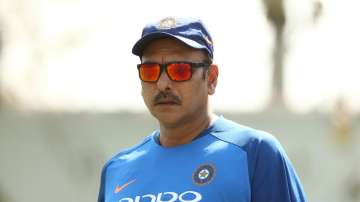The issues that could make or break Ravi Shastri’s second stint with Team India
Ravi Shastri has retained his position as the head coach of Team India, and we take a look at the key issues he faces as he prepares for his second stint with the Men in Blue.

Hopes and Expectations – two strong feelings, limited by the boundaries of irrational and rational. One would lead us to think that anything is possible, the other would confine us to the inevitable. The selection process of Team India’s new head coach was a near-perfect summarization of the two.
Ravi Shastri is the new head coach of the Indian men’s cricket team. He beat Tom Moody and Mike Hesson, among others, to retain the position. By no means had the former Indian cricketer-turned-commentator a poor record. The duo of Shastri and captain Virat Kohli has been successful in India and overseas, completing series wins in England and Australia. India are also the number one side in Tests at the present.
But, much like the season 8 of Game of Thrones, the climax of the partnership was devoid of closure. Mistakes were made behind-the-scenes. The fans were sad and frustrated. There were more expectations.
Nevertheless, the past is in the past and here we are. Ravi Shastri has been awarded another term – until the 2021 Twenty20 World Cup in India. The tenure would also cover the entirety of the inaugural World Test Championship, in which India will begin their campaign against the West Indies on August 22.
Ravi Shastri oversaw the rise of a potent Indian bowling attack in his first tenure, but the sport is full of challenges. As the Indian head coach gears up for a second stint with the side, let’s take a look at the key areas where Shastri might want to channel his energy:
Challenge 1:
The number-4 position in the fifty-over format has been subject to numerous debates and primetime coverage, but the Indian team was still searching for an answer when it entered the 2019 World Cup. Ambati Rayudu, one of the favourites for the role, lost his place months before the tournament began. Others like KL Rahul and Vijay Shankar weren’t given time to adjust. And, in the semifinal, Rishabh Pant, a rookie wicketkeeper-batsman, was sent in to bat at 4-2.
Thankfully, for the side, the arrival of Shreyas Iyer came as a blessing. His performances against the Windies in the recently-concluded ODI series oozed of confidence and discipline – two attributes which had been missing quite often in the Indian middle order. However, he was persisted with number 5, with Pant maintaining his place at 4 – which brings us to the next challenge.
Challenge 2:
The tactics adopted by the team management of late have baffled quite a few. The most recent, as mentioned above, is the batting position for Shreyas Iyer. Yes, one may argue that Rishabh Pant has been pushed for a constructive role. However, the fact that India had been searching for a stable number-4 escalates the urgency of the situation.
During the World Cup semifinal, the management sent MS Dhoni at number 7, when one of his major strengths (even when he is way past his prime) is smoothening the early blows and build a partnership. Instead, he came at a time when he was the last recognized batsman in the innings and India fell marginally short of victory.
Even if one excuses the failure in the World Cup, it didn’t seem the management had learnt from the past. The tour to the West Indies was a great opportunity to test the bench-strength, but the side persisted with first-teamers like Rohit Sharma, Shikhar Dhawan and Bhuvneshwar Kumar, despite having potential replacements at their positions on the bench.
Challenge 3:
Team India prides itself with immensely talented batsmen with supreme skills, who can make life tough for bowlers on their day. Yet, there have been technical flaws which Shastri and his management had failed to address in their first tenure.
The most glaring one, perhaps, is Rohit Sharma’s with a moving ball, which set India’s collapse in motion in the semifinal against the Kiwis. In Test matches, Virat Kohli and Cheteshwar Pujara have been the consistent performers for the side, but others have fairly struggled from time-to-time.
KL Rahul possesses brilliant abilities with the bat, but remains technically flawed. Ajinkya Rahane doesn’t inspire confidence as he used to, and Rishabh Pant’s instincts to attack have been an issue for quite some time. Ravi Shastri will have work to do in this regard.
Challenge 4:
The ‘chopping-and-changing’ in the Indian team is alarming, even when Ravi Shastri stated last year that they aim to remain consistent with regards to team selection. Number-4 dilemma aside, the side has been equally inconsistent in selection on various fronts.
Mayank Agarwal, who is yet to play a one-day international, was asked to fly to England during the closing stages of the World Cup to replace Vijay Shankar. The batsman, however, was not included in the limited-overs side for the tour to the West Indies, even when the likes of Shankar and Dinesh Karthik were not in the squad.
Shreyas Iyer had hit two half-centuries in four innings before being dropped in 2018 after the tour to South Africa. He was not considered for selection before the tour to the Windies, and Iyer had been public about the inconsistency in his selection ahead of the ODI series.
The lack of trust from the management has an adverse impact on players’ confidence, which, in turn, also affects their mental state. Ravi Shastri would want to focus on bringing some stability to the selection and instil mutual belief in the dressing room.